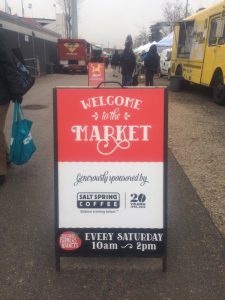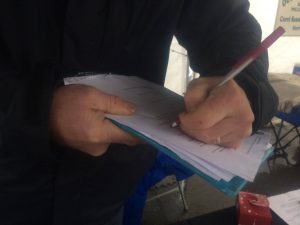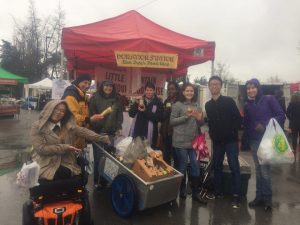This final blog posting revolves around our group’s collective reflection of what we have accomplished during the last few weeks of the term in a unified effort to conclude our community project. As we complete our last deliverables and research survey to identify community members who are interested in providing workshops for Riley Park, each one of us was given the opportunity to take on specific, contributing roles in which we all were able to gain invaluable learning experiences. Looking back on it as a whole, however, we agreed that one significant moment we faced was analyzing the data that we have gathered from our survey.

Fig 1. A sign at the Vancouver Farmer’s Market near the Nat Bailey stadium.
Our group organized both in-person and online surveys among various community members. After formulating what we thought was a decent list of interview questions to ask, three of our teammates set out to conduct in-person surveys at the Vancouver Farmer’s Market on March 11th, 2017. As we analyzed our initial set of data from the farmer’s market vendors, we realized that the possible answers we had anticipated to receive were too narrow in scope of the vendors’ actual, real-life replies. Our three expected responses regarding workshop provision interest (“I am interested”, “I am interested but unable to set up a workshop at this time”, “I am not interested”) did not accommodate a sizable amount of merchants who couldn’t provide a direct answer straightaway. As we pondered on this later, the situation became understandable as the people we interviewed may have needed much more time to think and consider a final decision.
Further data analysis of our farmer’s market responses also allowed us to discover a particularly important bias. Since most of the sample population we asked in the Vancouver Farmer’s Market were, unsurprisingly, farmers; we ended up identifying significantly more barriers for holding workshops due to long travel distances. As a lot of the farmers we surveyed actually live outside the boundaries of the Lower Mainland, a huge proportion of them were discouraged from providing workshops due to the long commute they would have to make.
In the end, our group was able to compile a set of data that will be helpful for Riley Park to gain insight on the interest of community partners to hold workshops. We obtained a total of 30 responses from both our online as well as in-person surveys. From those responses, the total number of barriers (which include time, travel distance, equipment, funding, experience) that were collectively identified amounts to 39, as one community partner could identify multiple barriers per survey. The aggregated results showed that a lack of time was the most common barrier for community members to provide workshops. We were also able to determine that even though our in-person survey yielded a greater number of replies, there was a relatively higher positive response rate (those who responded with ‘Yes’) from our online e-mail survey.

Fig 2. Our team in the process of interviewing and taking notes from vendors.
Moving forward, we hope that our community partner would be able to utilize the data we gathered to effectively assemble greater public interest to hold workshops for their education program. As our results suggest, it would be beneficial to target local community members (specifically those who reside in the Lower Mainland), place greater focus on an online surveying method (as this will likely lead to a higher positive response rate) as well as devise useful strategies to eliminate the barriers identified.
The unexpected answers and biases that we encountered during the farmer’s market matter greatly to our project and learning as they provide an opportunity for us to remodel our research methodologies and familiarize ourselves with uncertainties. Since we sent out our online surveys 10 days after our in-person interviews, we were allowed some time to regroup and critically think on our first survey experience. While the interviews at the farmer’s market was definitely a valuable time to study and further understand our project, it was even more satisfying to apply what we have learned by later remodeling our second, online survey: we included a “Maybe” response to accommodate survey participants who were undecided on their final answers and sent surveys to (and later received responses from) a wider range of community members by sharing community contact emails with Joanne, the Riley Park Collective coordinator. While implementing these changes represented a significant project shift, we felt that it was an opportunity that was worth pursuing (Session 7 – Indigenous Food Sovereignty + Moments of Significant Change | Land, Food + Community || (LFS 350), 2017).
Although it may be slightly frustrating to change an initial plan, we realized that it is an important opening for any kind of project/research to grow. According to Shulman, professional work is seldom accomplished with merely following the set concepts of proposition, operation or correct moral codes (2005). It was actually the crude, uncertain initial interviews we conducted that allowed us to learn from our flaws and yield a much more effective second survey. Accomplished work is most effectively achieved through experiencing uncertainties; the latter being a crucial ingredient through which one can acquire new skills and knowledge (Shulman, 2005).
Over the long haul, we felt great gratitude in our opportunities in being able to recognize the assets offered by our community partner and combine our academic knowledge with actual community experiences in a joint effort to develop “capacity building mindset[s]” (“Module 5 – Capacity building for sustained change”, n.d.). As a group, we conclude our time in LFS 350 by leaving the idea that different people/situations we come across with in school, work and the community will be clear-cut and predictable. In doing so, we would be able to readily embrace inevitable changes, exercise flexibility and acquire learning experiences in a wider range of settings. This notion is particularly exemplary for students and academic professionals to follow as it could help us to let loose, have fun and enjoy our future projects even more.

Fig 3. Little Mountain Neighborhood House volunteers, UBC’s International House of Scholar students and our three LFS 350 group mates (from far right to left – Catherine, Dean, Rachel B.).
References
Module 5 – Capacity building for sustained change. University of Memphis. Retrieved 9 April 2017, from http://www.memphis.edu/ess/module5/page3.php
Session 7 – Indigenous Food Sovereignty + Moments of Significant Change | Land, Food + Community || (LFS 350). (2017). Lfs350.landfood.ubc.ca. Retrieved from: http://lfs350.landfood.ubc.ca/session-notes/term-1-session-notes/session-7-indigenous-food-sovereignty-moments-of-significant-change/
Shulman, L. S. (2005). Pedagogies of uncertainty. Liberal Education, 91(2), 18–25.
